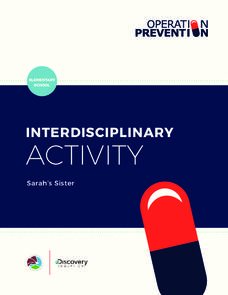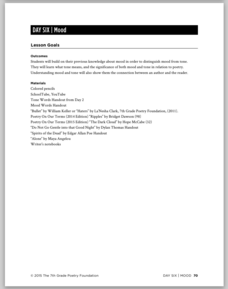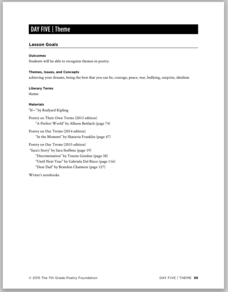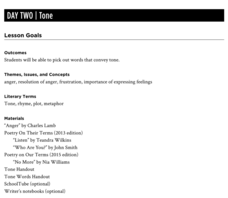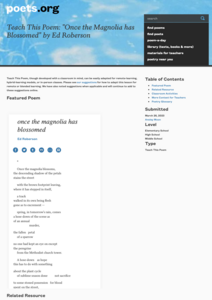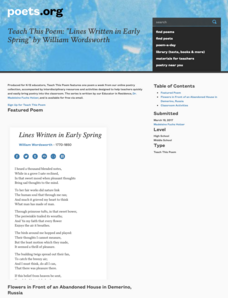US House of Representatives
“The Fifteenth Amendment in Flesh and Blood,” The Symbolic Generation of Black Americans in Congress, 1870–1887
The reading of a contextual essay launches a study of Black Americans who served in Congress from 1870 through 1887. Young historians identify the African Americans who served during this period, investigate the ways they won national...
Carolina K-12
“Stealing a Little Freedom”: Slave Runaways in North Carolina
As part of a study of slavery during the US colonial period, class members investigate why enslaved people ran away, the risks inherent in escaping, and the methods used to locate them.
Carolina K-12
An Overview of the Vietnam War
A highly engaging warm-up activity starts this plan for teaching class members about the Vietnam War. After the anticipatory activity, the teacher chooses how to provide an overview of the war (PowerPoint, lecture, textbook, etc.). Next,...
Discovery Education
Sarah's Sister
Does it matter where medication is stored in your home? Absolutely. The best way to identify proper and improper storage of medications is to participate in different role-play scenarios. A lesson models the safe storage of medications...
Carolina K-12
Loyalists and Patriots
Your young historians will square off as Loyalists dedicated to the English crown or revolutionaries fighting for a new nation in a role-play of a colonial town hall debate before the American Revolution.
University of North Carolina
The War of 1812
After reading a sample memo regarding the conflict between Britain and France before the War of 1812, class members assume the role of James Madison and brainstorm how to handle the situation. They will then analyze the creation and...
Curated OER
Reflection
The tenth lesson in the 12-part poetry unit asks seventh graders to reflect on their learning about poetry and share their work with other poets.
Curated OER
Poems and Resources for the Struggling Writer
The 11th resource in a 12-part poetry unit is a bonus lesson comprised of poems, activities, and resources that review the essential concepts of the unit.
Curated OER
Ballad
Young balladeers analyze examples of ballads and generate a list of common traits (story, quatrains, rhyme schemes, refrains, etc.), then identify these traits in Robert W. Service's "The Cremation of Sam McGee" and a ballad written by...
Curated OER
Concrete Poems
Concrete poems, or shape poems as they are sometimes called, are the focus of the eighth lesson in this poetry unit. Young scholars examine several examples of concrete poems and consider how the shape contributes to the poem's meaning.
Curated OER
Personification
Spongebob Squarepants helps teach middle schoolers about personification! After discussing the human characteristics demonstrated by the cartoon character, scholars identify the personification in poems by Emily Dickinson and Langston...
Curated OER
Poetic Devices
Introduce middle schoolers to poetic devices with a lesson that asks them to find examples of alliteration, anaphora, onomatopoeia, metaphors, similes, and personification in various poems. Young scholars craft examples of these poetic...
Curated OER
Mood
Young scholars learn how to distinguish between the mood of a piece of writing (how the work makes the reader feel) and the tone (the writer's attitude toward the material) in the sixth instructional activity in a poetry unit. After...
Curated OER
Theme
A study of Rudyard Kipling's poem, "If," launches a lesson about theme. Class members read Kipling's poem and poems by other seventh graders to identify the themes.
Curated OER
Revision
Young poets learn the value of using a thesaurus when crafting and revising poems. They examine poems rich in figurative language and then a revised version with the figurative language removed. To demonstrate what they have learned,...
Curated OER
Tone
Identifying the tone in a piece of writing can be tricky. Readers don't have the advantage of studying the images and colors used in a painting or the instruments and sounds of a song. The second lesson in this poetry unit teaches tweens...
Curated OER
What Is Poetry?
The first lesson plan of 12 in a poetry unit asks class members to develop their own definition of poetry. After crafting a response, they examine a variety of examples and decide if the resources are or are not poems.
Academy of American Poets
Teach This Poem: "The Metier of Blossoming" by Denise Levertov
Poetry analysis need not be a lugubrious exercise for young learners. The approach used with Denise Levertov's poem, "The Metier of Blossoming" is one of close observation, of noticing and reflecting on the words, phrases, and images the...
Academy of American Poets
Teach This Poem: “Crisscross” by Arthur Sze
Arthur Sze's poem "Crisscross" launches a instructional activity that asks scholars to use their observation skills. They first draw an image that reflects what crisscross means to them. They then examine a photograph of a lightning...
Academy of American Poets
Teach This Poem: "Instructions on Not Giving Up" by Ada Limón
What do the myth of the phoenix bird and Ada Limón's poem "Instructions on Not Giving Up" have in common? Young scholars create a list of what they notice about both the myth and poem, then consider what the similarities might indicate...
Academy of American Poets
Teach This Poem: "somewhere i have never travelled,gladly beyond" by E. E. Cummings
Scholars engage in a role-play exercise, compare their demonstration to a time-lapse video, and to a poem by E.E. Cummings. The ensuing discussion asks learners to consider the similarities among the three.
Academy of American Poets
Teach This Poem: "Once the Magnolia has Blossomed" by Ed Roberson
A free write, an image of magnolia leaves, and the Ed Roberson's poem "Once the Magnolia has Blossomed" ask scholars to use their noticing skills to reflect on the lesson beauty teaches about loss and grief.
Academy of American Poets
Teach This Poem: "Lines Written in Early Spring" by William Wordsworth
William Wordsworth's poem "Lines Written in Early Spring" lets learners sharpen their observation skills. Class members first closely examine the image "Flowers in Front of an Abandoned House in Demerino, Russia," listing what they...
Utah Education Network (UEN)
Know Your Literature Genres
Open the library for young readers by introducing them to the main genres and sub-genres. A podcast and two presentations identify the characteristics of the different genres. Groups then sort through a box of books and, using evidence...





